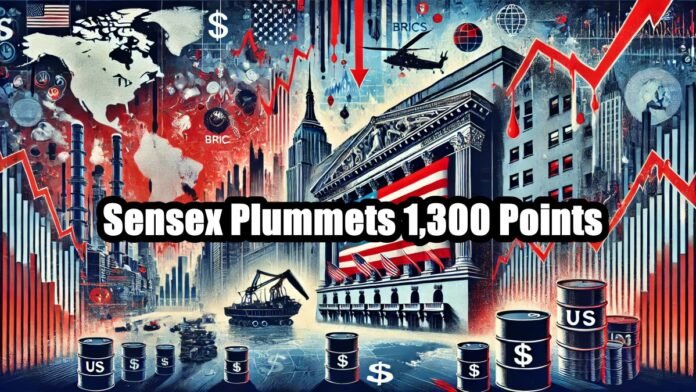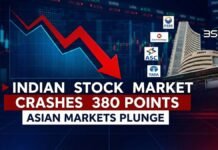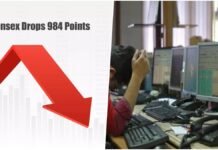
Key Points:
- Sensex Plummets 1,300 Points: Indian equity markets faced a sharp decline, with the Sensex losing 1.69%, driven by weak performances from key stocks like RIL, Kotak Bank, and Zomato.
- Market Capitalization Erodes: Investor wealth shrank by ₹8 lakh crore as negative sentiment gripped all sectors, reversing the previous session’s gains.
- Trump’s Trade Tariffs Shock Markets: US President Donald Trump’s announcement of 25% tariffs on Mexico and Canada, coupled with threats of 100% tariffs on BRICS nations pursuing de-dollarization, heightened global trade fears.
- Emerging Market Pressure: India, a key BRICS nation, stands vulnerable to Trump’s aggressive trade policies, further dampening investor confidence.
- Global Market Impact: Tariff fears, expectations of a Bank of Japan rate hike, and declining oil prices weighed on global and domestic markets, with mid and small caps also witnessing losses.
Mumbai/New York: Indian equity markets suffered a significant setback on Tuesday as the benchmark Sensex plunged 1,300 points, or 1.69%, to close at 75,773. The Nifty50 also fell below the crucial 23,000 mark, settling at 22,977 by mid-afternoon. The crash was fueled by US President Donald Trump’s aggressive trade tariff announcements and a weak global market sentiment, which erased ₹8 lakh crore in market capitalization.
The declines were broad-based, with all sectors ending in the red, reversing the optimism seen in the previous session. Key stocks such as Reliance Industries (RIL), Kotak Mahindra Bank, and Zomato were among the biggest losers, dragging the markets down.
Trump’s Tariff Shock Hits Indian Markets
Global markets were jolted by Trump’s 25% tariff announcement targeting imports from Mexico and Canada, scheduled to take effect in February. Adding to the turbulence, Trump threatened 100% tariffs on BRICS nations, including India, over their de-dollarization efforts.
“As a BRICS nation, India is particularly vulnerable to Trump’s aggressive trade stance. This uncertainty is weighing heavily on market sentiment,” said Prashant Tapse, Senior Vice President of Research at Mehta Equities.
The potential tariffs could disrupt India’s trade dynamics, further compounding investor fears amid rising global inflation and tightening monetary policies.
Bank of Japan Rate Hike Expectations
Global liquidity concerns also spiked as markets braced for a potential interest rate hike by the Bank of Japan (BOJ) on Friday. If implemented, it would mark the first hike since July 2024, potentially impacting global borrowing costs and adding pressure on emerging markets like India.
Global Markets Respond
Asian markets reflected the negative sentiment, with investors disappointed by Trump’s tariff announcements. U.S. stock futures pared earlier gains, with Nasdaq futures down 0.08% and S&P 500 futures up a marginal 0.07%. European markets also slipped, with EUROSTOXX 50 futures falling 0.25% and FTSE futures easing 0.02%.
Mid and Small Caps Take a Hit
The broader Indian markets were not spared, as mid-cap and small-cap indices each declined by 1%. “Valuations in mid and small caps remain stretched above long-term averages, suggesting further room for correction,” said Ajit Mishra of Religare Broking. He advised investors to adopt a stock-specific approach, focusing on strong, fundamentally sound businesses.
FII and DII Activity
Foreign Institutional Investors (FIIs) remained net sellers, offloading ₹4,336 crore worth of equities on January 20. Domestic Institutional Investors (DIIs), on the other hand, attempted to stabilize the market with net purchases of ₹4,322 crore.
Oil Prices Decline
Adding to the uncertainty, oil prices slipped following Trump’s plans to boost US oil and gas production. Brent crude futures fell 11 cents to $80.04 per barrel, while West Texas Intermediate (WTI) crude declined 67 cents to $76.72 per barrel.
Outlook and Analyst Recommendations
Despite the sharp decline, some traders believe the market is oversold and could see a temporary rebound. However, analysts caution against expecting a sustained recovery unless there are sector-wide improvements and clarity on Trump’s trade policies.
“Global uncertainty, combined with mixed earnings and continued FII selling, is likely to keep the markets volatile in the near term,” said Mishra.
As investors navigate these turbulent times, all eyes are on global developments, particularly Trump’s tariff implementations and the upcoming BOJ decision, which could further shape the trajectory of global and Indian markets.














































